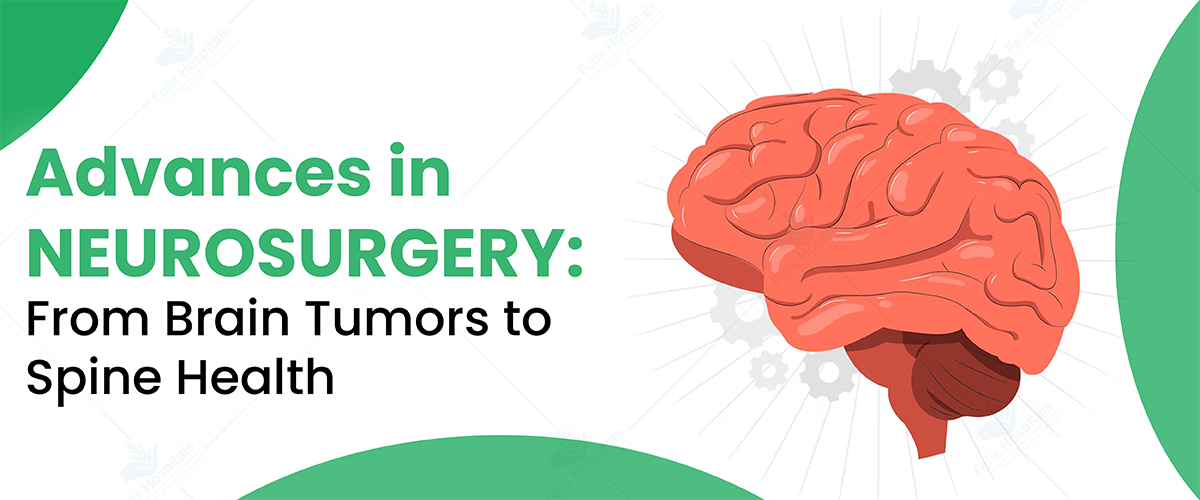
Subscribe to our

Neurosurgery deals with the entire nervous system that starts in your brain, runs through your spine, and branches out to all areas of your body. It addresses critical conditions like brain tumors, spine disorders, and nerve injuries. Hence, the highly technical surgery is dependent upon specialized equipment and techniques that often help a neurosurgeon to perform surgery with utmost precision and through least invasive procedures.
With innovations such as robotic-assisted surgeries, artificial intelligence in diagnostics, and minimally invasive techniques, patients now have access to safer and more effective treatments. These advancements not only improve surgical outcomes but also minimize recovery time, reduce complications, and enhance overall quality of life. At a leading neuro hospital in Noida, cutting-edge technology is revolutionizing the field of neurosurgery. Whether it’s about treating malignant brain tumors or correcting spinal issues, neurosurgery, leveraging the latest advancements, has transformed countless lives. Trust in expert care combined with modern innovations to ensure the best possible outcomes.
Schedule a consultation at Felix Hospital, the best neurosurgery hospital in Noida to meet our team of experienced neurosurgeons and explore personalized treatment options.
Neurosurgery addresses a variety of conditions affecting the nervous system, including:
Some of the most common diagnostic procedures include:
1. Biopsies: Biopsies help diagnose tumors of the spine and brain, infection, swelling, or abnormal growth. Three common types of biopsies are:
2. Computerized tomography (CT): CT scans are a type of X-ray that uses computers to create images of the inside of the head or spine. They help create three-dimensional simulations for surgical planning and medical modeling.
3. Magnetic resonance imaging (MRI): These scans are crucial in the diagnosis of brain and spine injuries and check the effectiveness of medicines or other treatments. Also, it can be used to create 3D simulations for surgical planning.
4. Electrophysiology: The procedure helps to locate any abnormal electrical signals in the brain and treat the specific areas that are affected by the injured or diseased tissue.
5. Electroencephalograms (EEG): The procedure involves use of sensors that are placed on the head to monitor the brain's electrical activity. EEGs are particularly helpful in diagnosing and determining the side effects of seizures, brain trauma, coma, and brain infections.
6. Myelography: It is an imaging test that produces a detailed picture of the spinal cord, nerve roots, and spinal column. The test helps in diagnosis of spinal tumors, herniated disks, and narrowing of the spinal canal.
At Felix Hospital, the best hospital for neurology in Noida, our Center for Neurosciences is equipped with state-of-the-art technology and a team of experienced neurologists, backed by neurosurgeons to provide comprehensive diagnosis and treatment for a wide range of neurological disorders. Our Center for Neurosciences is led by some renowned specialists such as Dr. Alok Kumar Dubey, Dr. Saumya Mittal, and Dr. Sumit Sharma provides round-the-clock services for early management of neurological emergencies like epilepsy and seizure disorders, stroke and neuromuscular weakness, and other neuroinfectious diseases and behavior changes.
At Felix Hospital, our multidisciplinary approach integrates expertise for our patients. To book an appointment contact us at: +(91) 9667064100
Advances in neurosurgery have transformed the way brain tumors and spine conditions are treated, offering hope to millions of patients.
Early diagnosis, cutting-edge technology, and expert care are the cornerstones of successful outcomes. By recognizing symptoms early, seeking timely intervention, and following preventive measures, individuals can protect their neurological health.
Recognized as the best neurological hospital in Noida, Felix Hospitals are committed to delivering you the best care.
If you wish to seek an appointment with our team of top neurosurgeons in Noida, contact us at: +(91) 9667064100
1. What are the benefits of minimally invasive neurosurgery?
Ans: Minimally invasive techniques reduce recovery time, minimize scarring, and lower the risk of complications.
2. How do I know if my symptoms require neurosurgical attention?
Ans: Persistent headaches, numbness, seizures, or chronic back pain should prompt a consultation with a neurosurgeon.
3. Can brain tumors be cured completely?
Ans: Depending on a tumor’s location and size, it may be possible to surgically remove a brain tumor completely. However, larger brain tumors or those deep inside brain tissue may be more difficult to surgically remove.
4. What are the most common spine problems?
Ans: The most common spine issues include herniated discs, degenerative disc disease, and spinal stenosis.
5. When should I see a specialist for spine issues?
Ans: Consult a specialist if you experience persistent pain, limited mobility, or neurological symptoms like tingling or weakness.